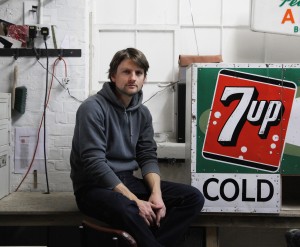Alastair is a Scot with an English accent. He has lived in Edinburgh, London and Shanghai, and before The Living Furniture Project he worked in marketing. Now Alastair split his time between this and writing – mainly about social enterprise, waste and good causes.
 G: Tell us about your business(-es): What do you do? What did inspire you to start? What is your unique selling point/competitive advantage compare to competitors?
G: Tell us about your business(-es): What do you do? What did inspire you to start? What is your unique selling point/competitive advantage compare to competitors?
The Living Furniture Project is a start-up which takes old, unwanted furniture and renovates it in a unique style. We train and employ homeless people to do this work in our workshop just off Commercial Street. And we’re planning to work with top-flight furniture makers to create all our furniture collections, starting with award-winning eco-designer Rupert Blanchard. He’s also based in Shoreditch and we’re very excited to be working with him. I came up with the idea when I managed to fully furnish my first London flat with furniture that other people were trying to get rid of. A few years later I looked into quite how much furniture was being thrown out, and the results were pretty shocking – about 10 million pieces each year going straight to landfill. And amazingly, the waste industry reckons nearly half of this is re-usable. I quit my job a couple of months later and here we are!
I also wanted to make sure we were a power for social good as well as environmental good, so I decided to only employ homeless people. They’re paid London Living Wage and their employment will get them into permanent accommodation and off the street. That’s a pretty powerful reason to get me up in the morning!I firmly believe that using a business approach to solve social problems is the way forward – we can’t count on the government since the cuts, and charities are sadly seeing pretty steep drops in terms of donations as the recession bites. So hopefully social enterprises like ours can pick up some of the slack.
 G: What were the biggest obstacles launching the start-up and how did you overcome them?
G: What were the biggest obstacles launching the start-up and how did you overcome them?
Getting enough money together has been a challenge, as it always is with new ventures. I’ve actually turned to crowdfunding to raise our funds – depending on how much you donate you can get an invite to our launch party, a piece of furniture, or various bits of memorabilia about our launch collection including a limited edition postcard, a short book or an oil painting. If anyone is feeling super-generous, the top donors you can also spend an afternoon with us learning some of the secrets of salvage, restoration and upcycling. And we’ll buy you a nice lunch!
G: What would you say has been your most memorable experience while developing your startup?
Starting a social enterprise is very different to starting a conventional business. I heard about an organisation in Edinburgh that was doing something quite similar to us. I jumped on the train, met the owner, sat in their workshop, leafed through their catalogue, found out all their prices, found out how they run the workshop, basically peered under the bonnet and had a good poke around. It struck me on the train back down that was quite unusual. Imagine the guy who was thinking about setting up Pepsi, calling up the guy that runs Coca Cola and saying “Can I come and look around your factory?” It wouldn’t happen! The social enterprise community is amazingly supportive.
G: Tell us about DO’s and DON’Ts when starting the company?
Do use your network. Do give yourself time to think. Don’t be afraid to ask questions. Don’t be wasteful.
 G: Why did you choose Shoreditch to launch your start-up? Or Why do you choose Shoreditch to run your business?
G: Why did you choose Shoreditch to launch your start-up? Or Why do you choose Shoreditch to run your business?
Shoreditch is perfect for us – we’re about connecting the best furniture makers with the vulnerable people in society, that need a little help to get their lives back on track. Shoreditch is creative, buzzing and houses some of the finest designers in the land. But it also has a big homeless population. It’s strange really, Shoreditch has seen so much wealth flood into it in the past few years, and The City is just up the road. But there’s still so many people left behind. I hope that the furniture makers will be an inspiration to our homeless employees, and vice versa.
G: Who/what are your favorite CEOs/Businesses in Shoreditch?
Old Truman Brewery has a very impressive set-up, so much variety. Pam Orchard, CEO of homelessness charity Providence Row, is a real ally. She’s been a big supporter from the start and very open-minded to our approach. Our workshop is actually based at their homeless day-centre on Wentworth Street.
G: What are your favorite places in Shoreditch? (Where do you hang-out/ dining/ going out?)
I enjoy a rummage in the Tea Rooms market at Old Truman Brewery, and occasionally sneak into The Owl & The Pussycat for a pint. I’d also recommend The Skylight Cafe on Commercial Street – great coffee and their staff are all ex-homeless.
G: What does the future have in store for Shoreditch?
A referendum on Boxpark?
Social links:
Twitter: @TheLFP
Facebook
Website/Blog


